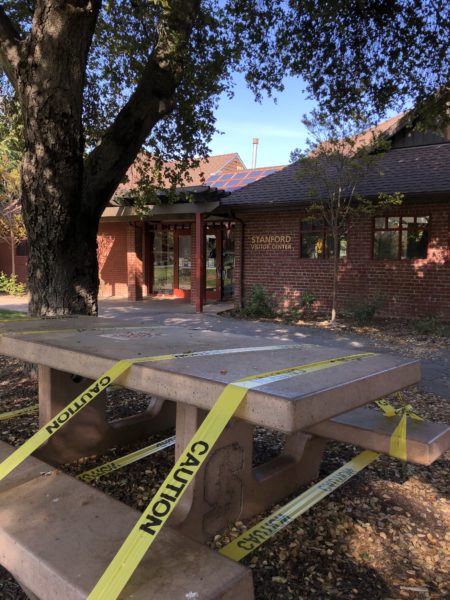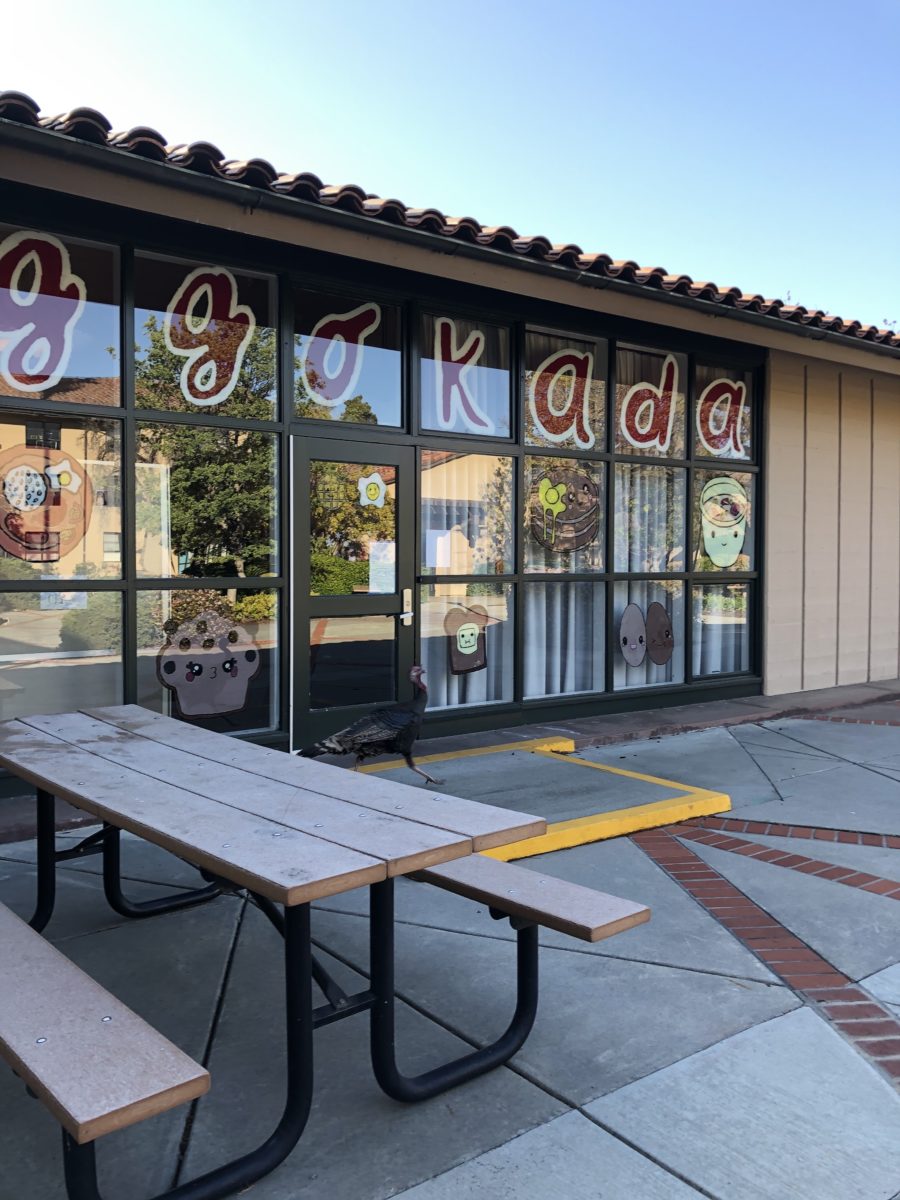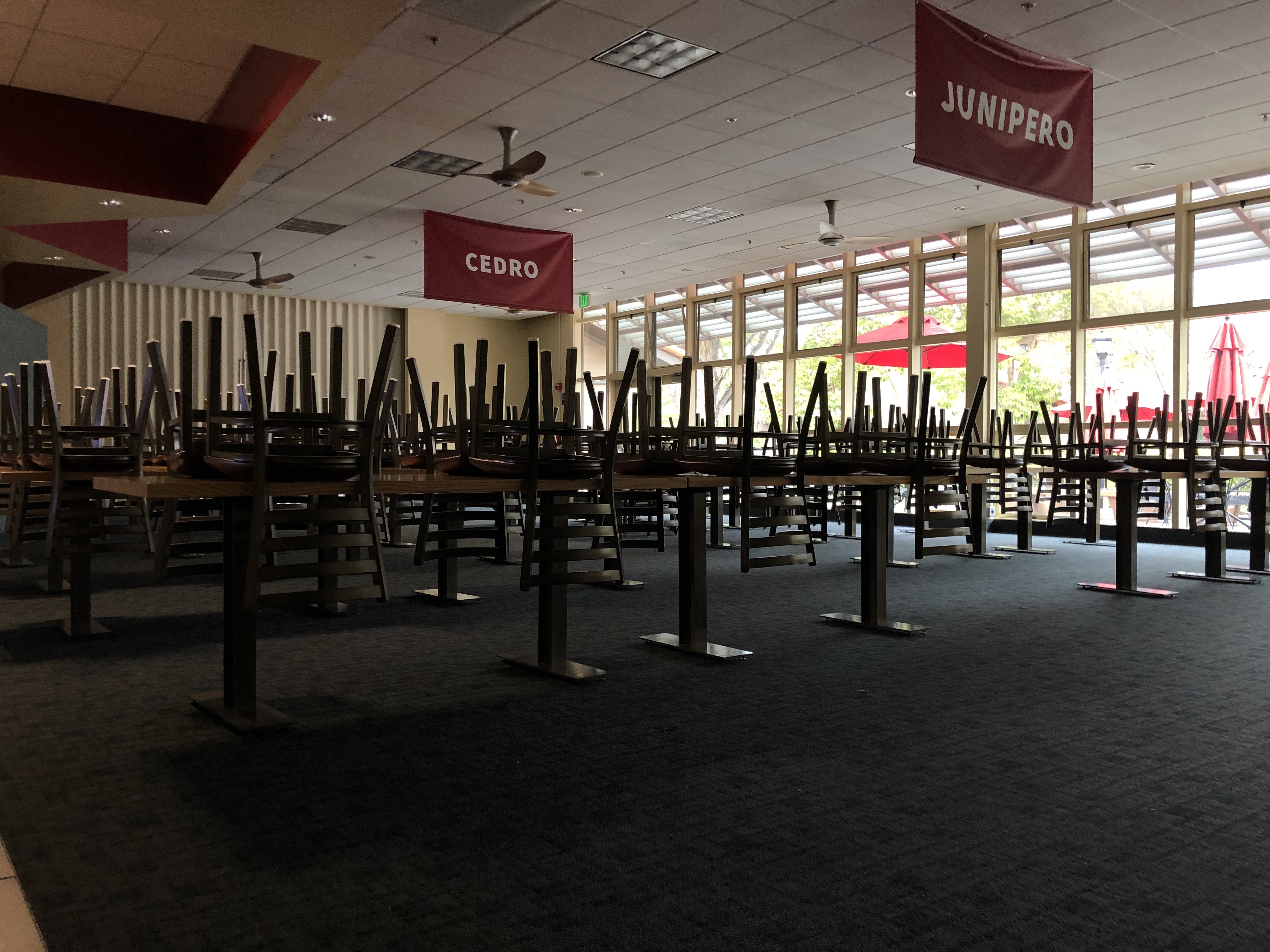This article is the fourth installment in a series examining how students are spending spring quarter.
As Stanford students around the world adjust to the fourth week of online classes, some haven’t left the campus at all. International students who stayed on campus are getting used to restrictions on socializing, life in new dorms, social distancing in the laundry rooms and the lack of the usual buzz on campus.
Life on a quiet campus
Not needing to dodge bikes around campus is “surreal,” students said. They don’t have to commute anymore: Social distancing rules don’t allow them to visit friends in other dorms. Persistent lines in Arrillaga Dining offer something constant in the new routine. At peak lunch times, the students are there, standing six feet apart, waiting for a vacant station to grab a meal and return to their room. Many of them dine in newly assigned residences, some still with their boxes unpacked.
Josh Mitchell ’23, a student from England, moved from his frosh dorm Junipero, or JRo, to the four-class dorm Castaño Hall. He had to leave JRo’s ping-pong table, frosh-dorm atmosphere and a double room with a balcony. The vibe in his new dorm isn’t quite the same, he said.
“It’s not like I say hello and they scurry off,” Mitchell said. “It is just when you get into the dorms that aren’t freshmen dorms they socialize less because they already have a group of friends. ”
He was also surprised by the restrictions on socializing and group activities on campus.
“We’re not allowed to do group activities,” Mitchell said. “I didn’t think it would be that strict and how we’re not allowed to socialize with all the dorms. I’ve got friends in other dorms, and I thought I would be hanging out with them a lot, but I don’t really see them because it is not allowed.”

Vy Thai ’23, a student from Vietnam staying in Okada, decided to stock up on units for the spring quarter to make use of the time free of extracurriculars and socializing.
“Now I’ve got nothing to do but study,” Thai said. “You know, like no activities … just studying from morning until I sleep. I chose all of my classes to start at 9:30 so I have motivation to wake up early. If not, I would wake up at 11 like during spring break.”
Geographical distance has not stopped him from creating study groups and staying in touch with friends.
“I usually call my friends everyday at 7 or 8 p.m. and we study together quietly in the Zoom virtual lounge,” Thai said. “My friend and I bonded more than before. Last quarter we stayed in the same dorm, we lived here together but we didn’t necessarily meet each other on a daily basis. Now, we literally call every night, we play games for study breaks and keep each other accountable.”
Thai has also been joined by new residents who’ve arrived amid the quiet.
“Turkeys just fly to my dorm, to Wilbur,” Thai said. “They walk around like no one is here.”

Qi Han ’23, a student from China who writes for The Daily, said that the feeling of a “Stanford bubble” hasn’t disappeared even as coronavirus spreads across the world.
“It feels weird to witness this historical moment when I’m in a prestigious university,” Han said. “It is a great contrast. Stanford is doing so much to help stop this global pandemic and my friends and I are walking peacefully as if everything’s the same under the lights on campus.”
University measures make her feel safe and secure, she said, almost making her “an outsider for this global pandemic.”
“It is, you know, normal, even though it is virtual schoolwork in a campus setting,” Han said. “I personally do feel a little bit detached from the increasing numbers. You know, I just can’t imagine what it means to have 700,000 people infected by this disease inside this country while I myself am safely living in this community. [Since Han spoke with The Daily, the known total of infected Americans has increased, now at more than 1 million, according to The New York Times.] I mean my life has changed a lot but I wouldn’t say it’s comparable to the degree that others might.”
These changes have manifested in small ways in Han’s new routine.
“Last night I went to the laundry room,” she said. “And when I got out of the room, I realized there has been a person outside the door waiting for me because there isn’t enough space to keep the six feet distance.”
Connection to home countries
In addition to adjusting to online education and communication with friends, international students have also faced challenges staying in touch with family members and their home cultures.
Han’s experience with COVID-19 began earlier in the year when the virus struck her hometown in China. Her family stayed safe during lockdowns and were able to sustain themselves and the community through the family-owned grocery store.
Now, they closely watch the situation in the U.S.
“I have to call them everyday to tell them I’m okay here, I’m safe.” Han said. “We’re getting used to the situation. But it would be better if I could safely go back home … It’s a time when you really need a person to physically be there.”
Thai regularly stays in touch with his family and tries not to “spend energy on being homesick.” When he wants to feel closer to his culture, he goes to the local Asian market and starts cooking.
Enshia Li ’22, a student from Canada who has also written for The Daily, doesn’t have time to be homesick with her spring quarter workload.
“I’ve been kind of occupied,” Li said. “I guess I haven’t thought of my parents as much as I should have. But we just talk quite regularly.”
But even with her routine in place, Li has felt an unexpected level of anxiety from COVID-19.
“I didn’t expect to be this worried, but I’m constantly very stressed because there’s been a few infection scares around me,” Li said. “And also just like not being at home. I mean, I know right now my parents are fine because of the lockdown in place. But for a while, before the lockdown happened, I was worried because I didn’t know whether or not they might get infected.”
Perspectives on coronavirus
Students brought in their international backgrounds in making observations about COVID-19.
When reflecting on Vietnamese and American cultures, Thai described a contrast between a “we mentality” he saw in Asian cultures and an “I mentality” in the West.
“Individualism and collectivism are different things,” Thai said. “The Western mentality is ‘I do what I want’, ‘I don’t want to wear a mask, I don’t wear it.’ In Vietnamese culture, you don’t care about yourself, you care about the society first. What you do matters.”
Li reflected on missing “the assurance of systems” in these uncertain times.
“What’s kind of irritating about this virus is that there’s no vaccine, there’s no cure,” Li said. “So, if it happens to you, no science can really save you. All you can do is just kind of watch it progress. I miss knowing that the vast majority of illnesses that we know can be treated in some manner.”
“Don’t go out, because many young people are asymptomatic,” Li advised. “You never know who might be spreading it to like even if you only talk with young people. You never know who the third person is down the chain of infections could be. Some people who are working are dying and really, really, really want to stay home and for anybody who has the capability to and is abusing that responsibility, I think that really ought to not happen.”
Han said that because COVID-19 affected the Chinese international community earlier, they tried to push the University to act quickly to protect their peers.
“The petition to stop classes, the first one going around, was organized by the people from Chinese international students community,” Han said. “They really wanted to push Stanford … to stop it as soon as possible because in China the number at that time was just raging to the number that none of us would ever expect. There were students saying, ‘We just don’t want it to happen again on campus’ and wanted to take care of everybody.”
Contact Anastasia Malenko at malenk0 ‘at’ stanford.edu.
